The trust of the Israeli public in the institutions of the state is at the heart of democracy and the resilience of Israeli society, which as we know constitutes a diverse mosaic of opinions and beliefs. Without trust in the state systems, including the IDF, the Supreme Court, the police and the political system, the social resilience of Israeli society may be significantly damaged.
Currently, the judicial reform continues to occupy the public agenda and together with it the demonstrations, which on one hand illustrate how strong the Israeli democracy is as the right to demonstrate and freedom of expression are a supreme value and on the other hand, they do not contribute to Israel’s national resilience in light of the call for insubordination by a significant portion of the protest leaders.
At the same time, the common claim among Prime Minister Benjamin Netanyahu’s opponents that he continues to corrupt Israeli society and cause a loss of trust in its institutions is once again raised. Not only is this a fundamentally unfounded claim in the mouths of those conducting a political struggle against the right-wing bloc that received the trust of the majority of the Israeli public in democratic elections but in practice, the Israeli public’s trust in some state institutions was low even before Netanyahu’s trial.
The data of the Israeli Democracy Index, a document published every year since 2003 by the Israel Democracy Institute, in which the degree of trust of the Israeli public in the various state institutions, including the IDF, the Supreme Court, the Israel Police, the Knesset, the government and the media, is tested clearly shows what the Israeli public thinks about each of these bodies.
Focusing on the level of trust among the Jewish public in Israel in those institutions gives us an even clearer picture when Israeli Arabs traditionally and for reasons related to the Israeli-Palestinian conflict, do not express trust in some bodies in the country, for example the IDF.

LOGIC GUIDES us to assume that in a democratic country it will be the state bodies, by definition, in which there is apparently no interference and political agenda, for example, the army and the Supreme Court, that will receive a very high level of support among the public. This is in contrast to political bodies, such as the parliament, the government and the political parties, which are likely to receive lower trust than the state bodies mentioned above. However, in Israel, sadly, the situation is different.
Thus, while the IDF consistently receives a very high level of trust among the Jewish public in Israel at an average rate of approximately 90% over the past two decades, in the Supreme Court, a body that is supposed to represent and reflect the whole of Israeli society, as former Supreme Court president Prof. Aharon Barak used to say, the situation is completely different.
Israelis do not trust the Supreme Court
As of 2022, the Supreme Court has the distrust of Jewish society in Israel, with only 41% expressing trust in it. In fact, the downward trend has clearly continued in the last decade, long before Netanyahu was even interrogated by the police, an indictment was filed against him and his trial began. Thus, while in 2012, about 72% of the Israeli public expressed trust in the Supreme Court, in 2017, trust dropped to 55% and to 48% in 2021.
The phenomenon of declining public trust in the Supreme Court is not new. In fact, even in the first decade of the 2000s, there was a decrease in trust among the Jewish public in the Supreme Court. Thus, while in 2004, 76% of the Jewish public in Israel expressed confidence in the Supreme Court, the trust in this important institution eroded and in 2008 it stood at only 48% (the same figure as in 2021) and again, before Netanyahu returned to the political front stage.
In conclusion, the claim that Netanyahu is the source of all the disputes and problems in the country in general and the decline in public confidence in the Supreme Court in particular, has long since lost all realistic validity. There is no doubt that the Supreme Court is one of the cornerstones of society and democracy in Israel and therefore it is important to maintain its independence in accordance with principle of the separation of powers and checks and balances.
However, a Supreme Court without public trust cannot be a strong and independent body and this, among other things, is what the judicial reform aims to correct.
The writer is a researcher at the Institute for National Security Studies (INSS) at Tel Aviv University and a research fellow at the University of South Wales, UK.
